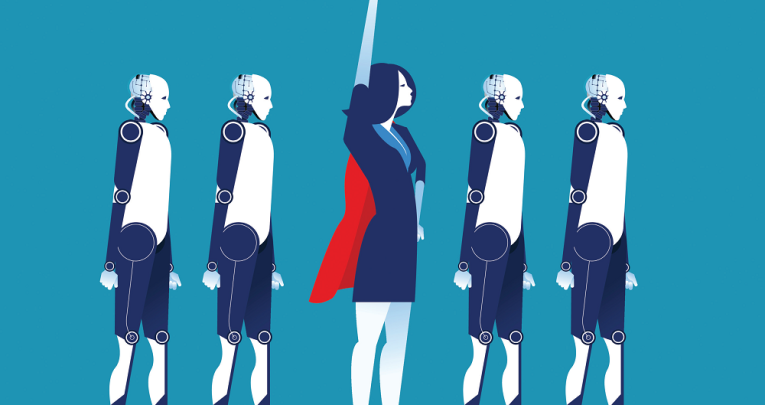AI Can Never Replace What a Teacher Does on a Daily Basis

Replaced by robots? Not yet. No matter how cunning the algorithms, artificial intelligence will never simulate what we do, says Kev Harcombe

- by Kevin Harcombe
- Former headteacher, writer and former UK Headteacher of the Year

It was my birthday last week. Apparently it was Google’s, too. 19 years young! Google, not me. That makes it not quite a callow youth, nor yet a fully-fledged adult either, but, like most teenage children, dominating our lives for both good and ill.
‘Why do we even need teachers when we have Google?’ is a question asked increasingly frequently, usually by teacher-haters that know nothing about learning (politicians, think tanks, etc).
You see them in below-the-line comments on online news sites. ‘There are sex robots now,’ they argue, ‘so why not teaching robots?’.
You can see the attraction. Standardised high-level practice, no pesky unions and no pensions to pay.
Nor is remote learning new. Correspondence courses have existed since the penny post was cutting-edge technology, and some children in remote areas of Australia were tutored via radio in the 1950s, albeit with a real teacher doing the tutoring.
The underlying assumption is that learning is all about fact-cramming and nothing else. You can google, ‘What is a fronted adverbial?’ – I know I have – but a good teacher can help you understand it, remember it and use it tastefully.
Teachers don’t simply deliver the facts, they can also express an opinion on the facts – that grammatical fetishes, for example, are almost completely useless other than as a way of appeasing an examiner or secretary of state (for, while no knowledge is entirely useless, being able to label a fronted adverbial comes close).
Teachers are also, when necessary, subversive. They have opinions. They teach children to ask ‘Why?’; to challenge orthodoxy in order to develop and progress.
Who is going to teach the next generation that massive global corporations can be huge forces for good – but only when good coincides with what the massive global corporation perceives as its own interest?
Who can demonstrate that taking humans out of the equation takes some humanity out of it too? Teachers, that’s who.
In some areas, artificial intelligence does have potential to make our lives easier. A dinner lady robot could sniff children’s water bottles to make sure it’s not sugary, flavoured water (as one Bradford school, with nothing more pressing to do, was criticised for doing last week) or hose down a four-year-old whose parents omitted to train her how to guide a forkful of food successfully to her mouth and thus stay alive.
In future these tasks could be done by low-paid casual workers, perhaps former teachers after the rise of the machines?
But what about more meaningful interactions? Despite cunning algorithms, Google has not yet managed to simulate the sophistication of human to human interaction which is where deeper learning takes place.
Try googling ‘I’m nine and my mum’s boyfriend punched me last night’ and see what use it is.
Teachers can respond to individual needs better than any app and can recognise and support the most vulnerable children. Computer learning is linear and limited by what the programmer has built in.
Teaching, like stand-up comedy, is a truly interactive performance. Teachers read the room and modify their act accordingly to try and reach every child – and avoid heckling.
Human-to-human interaction enhances learning immeasurably. Anyone who has ever told Amazon’s Alexa to eff off when she (again!) fails to find your favourite Adele song, knows what interacting with artificial intelligence is like – always artificial and seldom intelligent.
One of the best teachers I know nearly didn’t get appointed when the computer-based lesson she had prepared for her interview went west when the interactive whiteboard crashed.
Luckily she thought on her feet and did a cracking lesson using her subject knowledge and top notch interpersonal skills to engage the children, respond to the nuances of their reactions and generally do all the things that good teachers do, and that computers, for now, are unable to do.
Computers inevitably break down or wear out, and on current stretched school budgets we don’t have the money to repair or upgrade. (Teachers wear out too, but can usually be rebooted with a slice of cake and a cup of tea.)
They can also be duped. My Fitbit pesters me to walk until I reach the required 10,000 steps per day. But if I strap it to Jack (hyperactive, Year 2), hey presto, it’s fooled into thinking I’ve reached my target by morning break.
Man triumphs over machine – for now, at least.
So, happy birthday, dear Google. And if you want the music to go with those words, why not just google it?
Kevin Harcombe is a Teaching Awards winner and headteacher at Redlands Primary School, Fareham. Follow him on Twitter at @kevharcombe.










